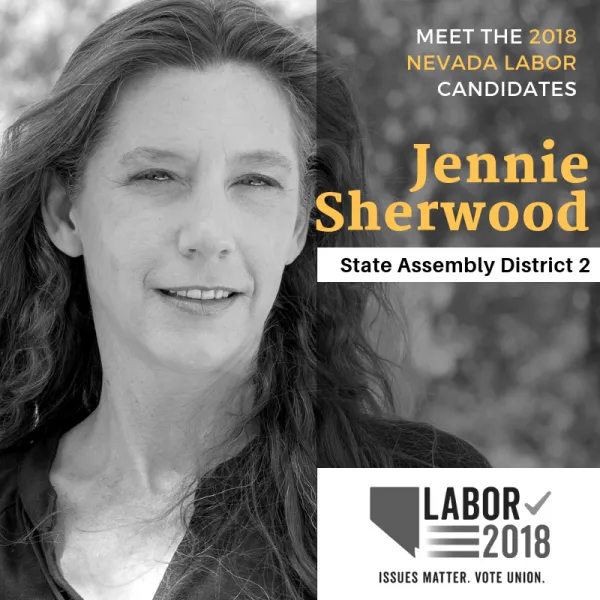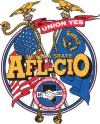
Fast Facts:
★As an IBEW 357 sister and former chair for the electric signs unit, Jennie's work is on display in iconic neon signs across Las Vegas.
★Despite being a newcomer up against an experienced opponent, Jennie's fired-up campaign won her 54% of the votes in the Nevada primary election.
★Jennie is a loyal fan of the Ford Mustang—she's owned four.
In politics, firebrands are are incitors. They're leaders who aren't afraid to be vocal for the things they care about and against those they oppose, who are partial to action and activism, who inspire and mobilize others, and who seek make big changes to an establishment they believe does not serve them.
One of the most outspoken, emerging firebrands to run for a Nevada office in recent years is, fittingly, one of our own—an IBEW sister whose work powers (literally) the iconic neon signs of Las Vegas.IBEW Local 357 member and Assembly District 2 candidate Jennie Sherwood says she had the stirrings of political interest when she was leading the signs unit of her local, but she didn't intend to run for office this year. Instead, she enrolled in the Emerge Nevada program—the state chaper of a national program that trains women leaders to run for political office—with the intent of running "in a few years." But partway through the program it became clear to Jennie that change could not wait—the time to run for an Assembly seat was now.
We talked with Jennie about her work, the issues that are most important to her, and why being an IBEW sister and former chair makes her uniquely fit to represent Assembly District 2, even as a newcomer.
You came out of the gate at 54% in your primary, despite being a newcomer. What makes now the right time for your to run for office? Why do you think Las Vegas voters were obviously ready to embrace you?
I really believe it's because I just know my people really well. I've been in Nevada since 1982. I get Nevada. I get our issues. I get where we come from and who we are. I'm in tune with a lot of the problems facing Nevada; I've even gotten some Republican support, because I think my message isn't so much a partisan message, it's just a really good Nevada message.
There are a lot of things that need work in this area, and nobody’s doing that work. Certainly Hambrick isn't doing that work. Nevadans are fed up with waiting.
You've served as chair of the signs unit for IBEW Local 357. What did that entail? How do you think it’s helped prepare you for a seat in politics?
Being a unit chair meant being fully engaged with all of my members. I conducted our monthly meetings, and was very active with communicating and keeping everyone educated and on board. I got to dig into issues like how contracts work, how negotiations work. I put together and oversaw my negotiating crew and our contracts, I got to see and participate in the business end of labor. I don't think I'd be here I if it wasn’t for my union, that experience and support.
I also got to see the back end of the business and political community, and saw just much information out there was being publicly misrepresented. It made me wonder—where else is this happening? How much else is being misrepresented to the public?
I'm a Democrat, but I'm often disappointed in my party for not being more vocal, not being out there selling their ideas. We've got to be talking about these issues. I'm running because I want to be a strong voice in my party to get these ideas out there and get people working on them.
The Emerge Nevada program took my work in the union and as unit chair up a level. They showed me how to run a campaign, how to build a team, how to build a base. And it helped me realize that this is the year of the woman, and the right time to run. I had been thinking of running for office as a future goal, that at the very least I can build a name for myself, build a base, and be ready win in the next election. But no, actually—I decided this is the right time. I can put my name in there and win now.
I won my primary because I know how to work. I know how to walk. My opponent didn't walk like I can walk—I WALKED—and it paid off.
As a union worker, you understand first-hand how critical it is for Nevada workers to be paid a living wage, and to be paid overtime when they work overtime. There’s controversy blowing up right around Adam Laxalt and Wes Duncan and their efforts to block rules that would pay Nevadans for their overtime work. What are your plans for impacting workers issues like these?
Yes, this is big. Union contracts pay overtime after 8 hours on any day and after 40 hours on any week, and on weekends—that's part of their value to workers. But union or non-union, workers need to be paid for the time they work, period. Undermining a family's ability to earn a good living by withholding overtime isn't good for the middle class.
We need to put a big effort into bringing up wages, we need to be loud and obnoxious about it. We need to get back to a place where our middle class is growing again, our poverty levels are shrinking, and everybody respects the men and women getting up to go to work every day.
What are your other top priorities as an Assemblywoman?
Education. I will not stop until we improve it.
In that spirit, workforce education is having a renaissance, and both the federal government and the State of the Nevada are increasing their efforts and funding in that area. How do you see your role in helping to increase workforce education in Nevada, and why is it important now?
That’s one of my major goals—bringing career diversification back into our educational system. Not all good-paying jobs aren’t college degree kinds of jobs. We sent our whole last generation to college and oops! There weren't jobs waiting for them when they graduated into the workforce. More than 800,000 machine operator jobs are sitting empty across the country, but we’re not training for those. Everybody's still stuck in the must-go-to-college mindset.
I not only want to bring high-tech trades back into public school system, I want to create a modern trade school for adults that works in concert with registered apprenticeship programs. I want to simplify and streamline workforce education, make it more accessible for people of all ages to come in and train for these in-demand, high-paying jobs. I want to see advanced technology in our trads programs, and cutting-edge, specialized certification programs. I want them to be employer-connected.
Why is it important right now? Because if we can't turn out the skilled labor that these big companies moving to Nevada—or considering moving to Nevada—need, they're not going to come here, and they're not going to stay here. If we have a large and well-trained skilled workforce, we're going to attract some great businesses to Nevada. That benefits all of us.
What do you see as your biggest advantage in defeating John Hambrick in November? What should Las Vegas voters who are on the fence know about you?
That's easy: I don’t fight for ideology or what my party says I should do. I saw a piece about John Hambrick recently when he was asked what he planned to work on in the next session, and he said “I don’t know, the Republican caucus will let me know what to do.”
That amazed me. That's not who I am. I take my direction from one source only: the Nevadans I represent. ☆
This interview has been edited for length and clarity. To learn more about Jennie, visit her website at https://www.jennie4nevada.com.
